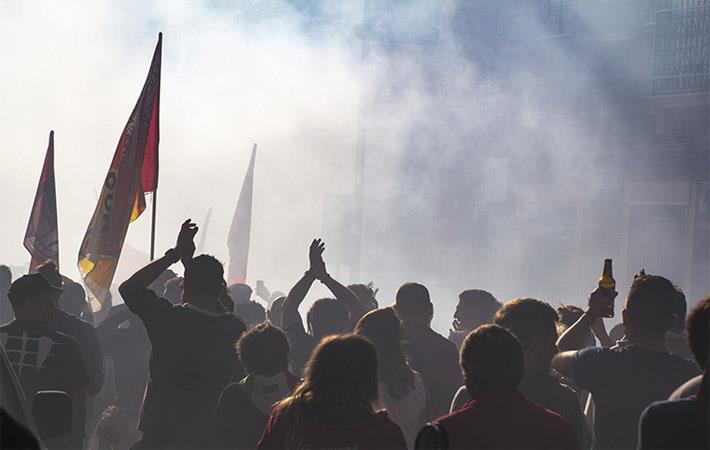Interviews
Democratic space shrink & corporate greed are rising: ITUC
17 Jun '18
4 min read

Courtesy: ITUC
Shrinking democratic space for working people and unchecked corporate greed are on the rise according to the annual International Trade Union Confederation (ITUC) Global Rights Index. The number of countries with arbitrary arrests and detention of workers increased from 44 in 2017 to 59 in 2018, and freedom of speech was constrained in 54 countries.
The ITUC Global Rights Index 2018 ranks 142 countries against 97 internationally recognised indicators to assess where workers’ rights are best protected in law and in practice.
“Decent work and democratic rights grew weaker in almost all countries, while inequality continued to grow. This was fuelled by the outrageous behaviour of many multinational companies, such as Samsung whose anti-union practices deny workers freedom of association and collective bargaining rights, as shown in internal company documents seized from their offices in Korea. And the corporate power of Amazon continues to grow unchecked, from treating workers like robots to threatening to halt its expansion in Seattle over tax proposals to create affordable housing,” said Sharan Burrow, general secretary, ITUC.
The report says that 65 per cent of countries exclude some groups of workers from labour law and 87 per cent of countries have violated the right to strike. About 81 per cent of countries deny some or all workers collective bargaining. Out of 142 countries surveyed, 54 deny or constrain free speech and freedom of assembly.
The number of countries in which workers are exposed to physical violence and threats increased by 10 per cent (from 59 to 65) and include Bahrain, Honduras, Italy and Pakistan, adds the report. Countries where workers are arrested and detained increased from 44 in 2017 to 59 in 2018. Trade unionists were murdered in nine countries - Brazil, China, Colombia, Guatemala, Guinea, Mexico, Niger, Nigeria and Tanzania.
The report ranks the ten worst countries for workers’ rights in 2018 as Algeria, Bangladesh, Cambodia, Colombia, Egypt, Guatemala, Kazakhstan, the Philippines, Saudi Arabia and Turkey.
Haiti, Kenya, Macedonia, Mauritania and Spain have all seen their rankings worsen in 2018 with a rise in attacks on workers’ rights in law and practice.
The Middle East and North Africa was again the worst region for treatment of workers, with the kafala system in the Gulf still enslaving millions of people. The absolute denial of basic workers’ rights remained in place in Saudi Arabia. Conflict in Libya, Palestine, Syria and Yemen has led to the breakdown of the rule of law and the denial of the right to find a decent job. Peaceful protests were violently repressed and attempts at forming an independent labour movement were systematically crushed by the authorities in Algeria and Egypt.
Conditions in Asia-Pacific have deteriorated with an increase in violence, criminalisation of the right to the strike and a rise in arrests, detention and imprisonment of labour activists and trade union leaders. All 22 countries in the region violated collective bargaining and the right to strike. Mass dismissals of workers for exercising their rights were found in Indonesia, where 4,200 workers were laid off by mining operator PT Freeport; Myanmar, where 184 union members were made redundant; and Cambodia, where 558 workers were fired after a strike at the Gawon Apparel Factory.
In Africa, workers were exposed to physical violence in 65 per cent of countries in the region. Protests in Nigeria were violently repressed by the army, and one worker was killed by unknown gunmen during a strike.
In Europe, 58 per cent of countries violated collective bargaining rights, and three quarters of countries violated the right to strike.
The Americas remain plagued by the pervasive climate of extreme violence and repression against workers and union members; in Colombia alone 19 trade unionists were murdered last year – a dramatic rise from 11 in the previous year.
The ITUC has been collecting data on violations of workers’ rights to trade union membership and collective bargaining around the world for more than 30 years. This is the fifth year the ITUC has presented its findings through the Global Rights Index, putting a unique and comprehensive spotlight on how government laws and business practices have deteriorated or improved in the last 12 months. (KD)
The ITUC Global Rights Index 2018 ranks 142 countries against 97 internationally recognised indicators to assess where workers’ rights are best protected in law and in practice.
“Decent work and democratic rights grew weaker in almost all countries, while inequality continued to grow. This was fuelled by the outrageous behaviour of many multinational companies, such as Samsung whose anti-union practices deny workers freedom of association and collective bargaining rights, as shown in internal company documents seized from their offices in Korea. And the corporate power of Amazon continues to grow unchecked, from treating workers like robots to threatening to halt its expansion in Seattle over tax proposals to create affordable housing,” said Sharan Burrow, general secretary, ITUC.
The report says that 65 per cent of countries exclude some groups of workers from labour law and 87 per cent of countries have violated the right to strike. About 81 per cent of countries deny some or all workers collective bargaining. Out of 142 countries surveyed, 54 deny or constrain free speech and freedom of assembly.
The number of countries in which workers are exposed to physical violence and threats increased by 10 per cent (from 59 to 65) and include Bahrain, Honduras, Italy and Pakistan, adds the report. Countries where workers are arrested and detained increased from 44 in 2017 to 59 in 2018. Trade unionists were murdered in nine countries - Brazil, China, Colombia, Guatemala, Guinea, Mexico, Niger, Nigeria and Tanzania.
The report ranks the ten worst countries for workers’ rights in 2018 as Algeria, Bangladesh, Cambodia, Colombia, Egypt, Guatemala, Kazakhstan, the Philippines, Saudi Arabia and Turkey.
Haiti, Kenya, Macedonia, Mauritania and Spain have all seen their rankings worsen in 2018 with a rise in attacks on workers’ rights in law and practice.
The Middle East and North Africa was again the worst region for treatment of workers, with the kafala system in the Gulf still enslaving millions of people. The absolute denial of basic workers’ rights remained in place in Saudi Arabia. Conflict in Libya, Palestine, Syria and Yemen has led to the breakdown of the rule of law and the denial of the right to find a decent job. Peaceful protests were violently repressed and attempts at forming an independent labour movement were systematically crushed by the authorities in Algeria and Egypt.
Conditions in Asia-Pacific have deteriorated with an increase in violence, criminalisation of the right to the strike and a rise in arrests, detention and imprisonment of labour activists and trade union leaders. All 22 countries in the region violated collective bargaining and the right to strike. Mass dismissals of workers for exercising their rights were found in Indonesia, where 4,200 workers were laid off by mining operator PT Freeport; Myanmar, where 184 union members were made redundant; and Cambodia, where 558 workers were fired after a strike at the Gawon Apparel Factory.
In Africa, workers were exposed to physical violence in 65 per cent of countries in the region. Protests in Nigeria were violently repressed by the army, and one worker was killed by unknown gunmen during a strike.
In Europe, 58 per cent of countries violated collective bargaining rights, and three quarters of countries violated the right to strike.
The Americas remain plagued by the pervasive climate of extreme violence and repression against workers and union members; in Colombia alone 19 trade unionists were murdered last year – a dramatic rise from 11 in the previous year.
The ITUC has been collecting data on violations of workers’ rights to trade union membership and collective bargaining around the world for more than 30 years. This is the fifth year the ITUC has presented its findings through the Global Rights Index, putting a unique and comprehensive spotlight on how government laws and business practices have deteriorated or improved in the last 12 months. (KD)
Fibre2Fashion News Desk – India
Popular News
Leave your Comments
Editor’s Pick
Durga Prasad Chalavadi
Sai Silks Kalamandir Ltd
Sharif Tarequr Rahman
Rashni Poly Fiber Industries Ltd.
































-Ltd..jpg?tr=w-120,h-60,c-at_max,cm-pad_resize,bg-ffffff)





.jpg?tr=w-120,h-60,c-at_max,cm-pad_resize,bg-ffffff)
.jpg?tr=w-120,h-60,c-at_max,cm-pad_resize,bg-ffffff)






